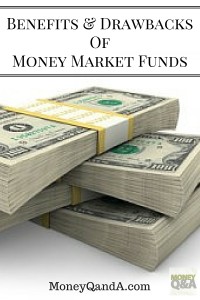
Money market funds provide investors an great alternative to simply holding cash. They are great short term cash investments.
Money market funds are deposit accounts that earn interest by investing in short-term, low-risk investments such as U.S. Treasuries, short-term bonds, certificates of deposit, and other conservative investment products that have very little risk of principle loss. Money market funds are a mutual fund that focuses solely on low risk investments.
What Are Money Market Funds?
Money market funds are a variety of mutual funds that buy short-term financial debt in the secondary markets. Money market funds try to maintain their net asset value, or NAV, at a constant $1.00 per share.
Despite the market turmoil of 2008, money market funds rarely see their NAV change up or down from the $1.00 per share mark. Money market funds are supposed to one of the safest fund investments available, and the amount of interest earned is commiserate to that.
Benefits Of Money Market Funds
The advantage of a money market fund is security, liquidity, and yield. One benefit to these types of accounts is that you do not need a lot of money to open one. May banks and investment firms allow new investors to open a money market with as little as $25 dollars in some cases especially if investors are making monthly contributions.
They are perfect for teaching your children about savings accounts and also investing initially. Money market funds also offer investors a safe place for long and short term cash investments to invest their cash position to help balance their portfolio as they approach retirement age.
Drawbacks Of Money Market Funds
Money market funds are not insured nor guaranteed from the Federal Deposit Insurance Corporation (FDIC) or other federal government agency. While the probability of money market funds dropping below their $1.00 NAV price target per share is extremely remote, it has happened before on several occasions.
Money market funds will produce a lesser amount of income because the interest they earn on the safe investments they own is often very small. Until the Federal Reserve raises the Federal Funds Rate, many money market fund investors will not see a large increase in their rate of return.
The typical fund yielded an annualized 0.08% rate of return recently. But, 275 taxable funds or 23% of the 1,180 funds iMoneyNet tracks, do not even produce any yield.
About The Funds
Many funds are sold through retail brokerage establishments directly to the general public. Most of those selling directly to investors have reported below-average yields. Fees are another consideration that investors must make when purchasing shares.
The typical money market fund charges approximately 0.4% annually for expenses. This expense charge continues to depress the rate of return investors earn from the funds.
